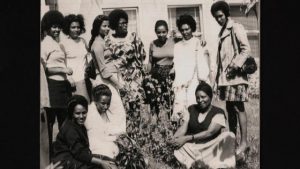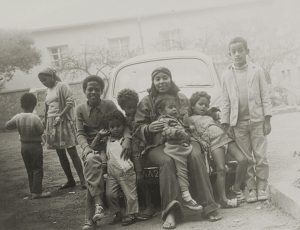In Vancouver, BC Tune in every Wednesday 6 – 7 PM to CFRO – 100.5 FM
Anywhere in the world by Stream, Satellite, TelusTv - How to Listen
Only last 10 shows are available to listen to for free - REGISTER NOW. Supporting Members have unlimited access to this and hundreds of other life changing programs - Click Here to sign-up
Join Tasha Simms as she speaks with Tamara Dawit, director of “Finding Sally”, a documentary about Sally, an aristocrat, a dignitary’s daughter, and an Embassy brat. Her father’s posting as an Ethiopian diplomat meant that the family lived in various countries before settling in Canada in 1968. Selamawit Dawit – Sally to her friends – went to Carleton University in Ottawa and was a bright, outgoing young student with many friends and hopeful suitors. In the summer of 1973, Sally traveled to Ethiopia on holiday. She never came back.Finding Sally tells the incredible story of a 23 year old woman from an upper class family who became a communist rebel with the Ethiopian people’s revolutionary party. Idealistic and in love, Sally got caught up in her country’s revolutionary fervor and landed on the military governments most wanted list. She went underground and her family never saw her again.
Four decades after Sally’s disappearance, Tamara Dawit pieces together the mysterious life of her Aunt Sally. She revisits the Ethiopian Revolution and the terrible massacre that followed, which resulted in nearly every Ethiopian family losing a loved one. Her quest leads her to question notions of belonging, personal convictions and political ideals at a time when Ethiopia is going through important political changes once again.
https://www.facebook.com/ConsciousLivingRadio/videos/2583216368618116/?t=1
ABOUT SALLY
Sally was an aristocrat, a dignitary’s daughter, and an Embassy brat. Her father’s posting as an Ethiopian diplomat  meant that the family lived in various countries before settling in Canada in 1968. Selamawit Dawit – Sally to her friends – went to Carleton University in Ottawa and was a bright, outgoing young student with many friends and hopeful suitors. In the summer of 1973, Sally traveled to Ethiopia on holiday. She never came back.
meant that the family lived in various countries before settling in Canada in 1968. Selamawit Dawit – Sally to her friends – went to Carleton University in Ottawa and was a bright, outgoing young student with many friends and hopeful suitors. In the summer of 1973, Sally traveled to Ethiopia on holiday. She never came back.
In a few short months, Sally’s life changed drastically. She went from being a party girl obsessed with clothes and perfume to a communist and women’s group leader who gave speeches against the Ethiopian government.
During her tumultuous time in the Ethiopian capital of Addis Ababa, she was swept up in the Marxist movement after meeting Tselote Hizkias, deputy commander and future rebel leader of the Ethiopian People’s Revolutionary Party (the EPRP). Deeply in love, Sally and Tselote were married in a small civil ceremony. Together, they fought to overthrow Emperor Haile Selassie. In power since 1930, Selassie was Ethiopia’s Head of State and a close acquaintance of Sally’s father.
In September of 1974, the military junta (“the Derg”) toppled Selassie in a military coup. Its leader, Mengistu Haile Mariam, declared himself Chairman, ignoring the communist ideals and youth movement that powered the revolution. The EPRP challenged the Derg’s rule and pushed for a broad-based civilian-run democracy while also engaging in campaigns against the military government. The Derg, in turn, launched attacks against the EPRP, sending both the military and armed peasant groups to track down hundreds of “enemies of the state.” Violence soon became widespread across the country.
Sally and her husband hastily went underground. Together, they escaped Addis Ababa and vanished into the mountains of Northern Ethiopia. For years, Sally’s family searched for her throughout Europe, Africa and North America. They desperately chased rumours of her whereabouts, showing her photo to strangers and seeking help from mystics.
Some forty years after the events, director Tamara Dawit pieces together the mysterious journey of Sally, the aunt she never knew. No one in her family had been willing to speak about this mysterious relative, but after years of persistent questioning, family members are starting to fill in the blanks.
Like most Ethiopians, the Dawits learned to stay silent about events that occurred during the “Red Terror”– a
 bloodbath from 1977 to 1978 that Amnesty International has stated was responsible for the slaughter of hundreds of thousands of people. The Derg remained in power until 1991.
bloodbath from 1977 to 1978 that Amnesty International has stated was responsible for the slaughter of hundreds of thousands of people. The Derg remained in power until 1991.
If time doesn’t necessarily heal such deep wounds, it at least allows the fear to gradually subside. Today, in a time when Ethiopia is going through important political changes once again, many Ethiopians are ready to share their story. Using Sally’s personal history as a thread, the film sheds light on a dark and little-known chapter of Ethiopian history.
Finding Sally features intimate testimonials from Tamara’s grandmother and aunts, a moving collection of recovered family photos, a wealth of fascinating stock footage from the 60s and 70s, and evocatively crafted visuals that invoke the presence of Sally throughout the story. Who was Sally? How and why did she become a revolutionary? Whatever the answers may be, one thing is certain – Sally’s fate is deeply entwined with the fate of the countless individuals who died during the Red Terror.
Tamara’s Directors Statement
As a child, I grew up hearing elaborate stories about their childhoods from my vibrant Ethiopian aunts – tales about their grandmother helping the war effort against the Italians, meetings with fortune tellers, hitchhiking in Europe, lavish cocktail parties, or sneaking out to go to the beach. The stories were pleasurable and exciting, painting a vision of a wonderful past. However, I could never decipher which stories were true and which ones had been spiced up with their typical Ethiopian romanticism.
Lost in all their stories was Sally, a family member that no one ever mentioned to me. It wasn’t until my early 30s that I had stumbled upon a photo of Sally, but the family was hesitant to talk about her. Little by little, I managed to convince my grandmother and then my aunts to share Sally’s story.
Each of my aunts has her own version of events and point of view regarding Sally. However, despite their differences in opinion, my aunts all share a common sense of loss. The film poses the question that arises when someone you love disappears without a trace: how do you cope? It explores not only how my family has managed this loss, but also how the entire country has managed the loss, pain, and trauma of the Red Terror (a period of sustained state violence). My family is just a small example of how many Ethiopians are still dealing with those deaths, and how the fear of public mourning under the military government forced so many people to suffer in silence.
My aunt Sally and many of her peers lost their lives fighting for what they believed could be a better Ethiopia. They envisioned a united and democratic Ethiopia that would embrace everyone equally – something I think is still possible despite the dangerous ethnic divisions that plague Ethiopia today.
I hope that Finding Sally can be a plea for freedom of speech and critical thinking, and also an indictment of silence in general in Ethiopia. Even today, as young people frequently protest the government, their elders are still hesitant to talk about their own activism and past losses which closely mirror many aspects of the present-day situation. I hope that this film can be a catalyst to discussing the country’s past and engaging in critical discourse about the road ahead.
About Tamara
 Tamara Dawit is a producer/director based in Addis Ababa, Ethiopia where she runs a production company Gobez Media that produces Ethiopian film, TV, digital and music content. Tamara has experience producing music content, tours, creative documentaries, digital content, formatted television and is now branching into dramatic films. She has produced content for CBC, Bravo, MTV, Radio Canada, Discovery, and NHK, among other networks. She directed the short film Grandma Knows Best (Bravo) and the feature documentary Finding Sally (CBC) which will be released in 2020.
Tamara Dawit is a producer/director based in Addis Ababa, Ethiopia where she runs a production company Gobez Media that produces Ethiopian film, TV, digital and music content. Tamara has experience producing music content, tours, creative documentaries, digital content, formatted television and is now branching into dramatic films. She has produced content for CBC, Bravo, MTV, Radio Canada, Discovery, and NHK, among other networks. She directed the short film Grandma Knows Best (Bravo) and the feature documentary Finding Sally (CBC) which will be released in 2020.
Tamara is of Ethiopian, Eritrean, Ukrainian and British ancestry.

You must be logged in to post a comment Login